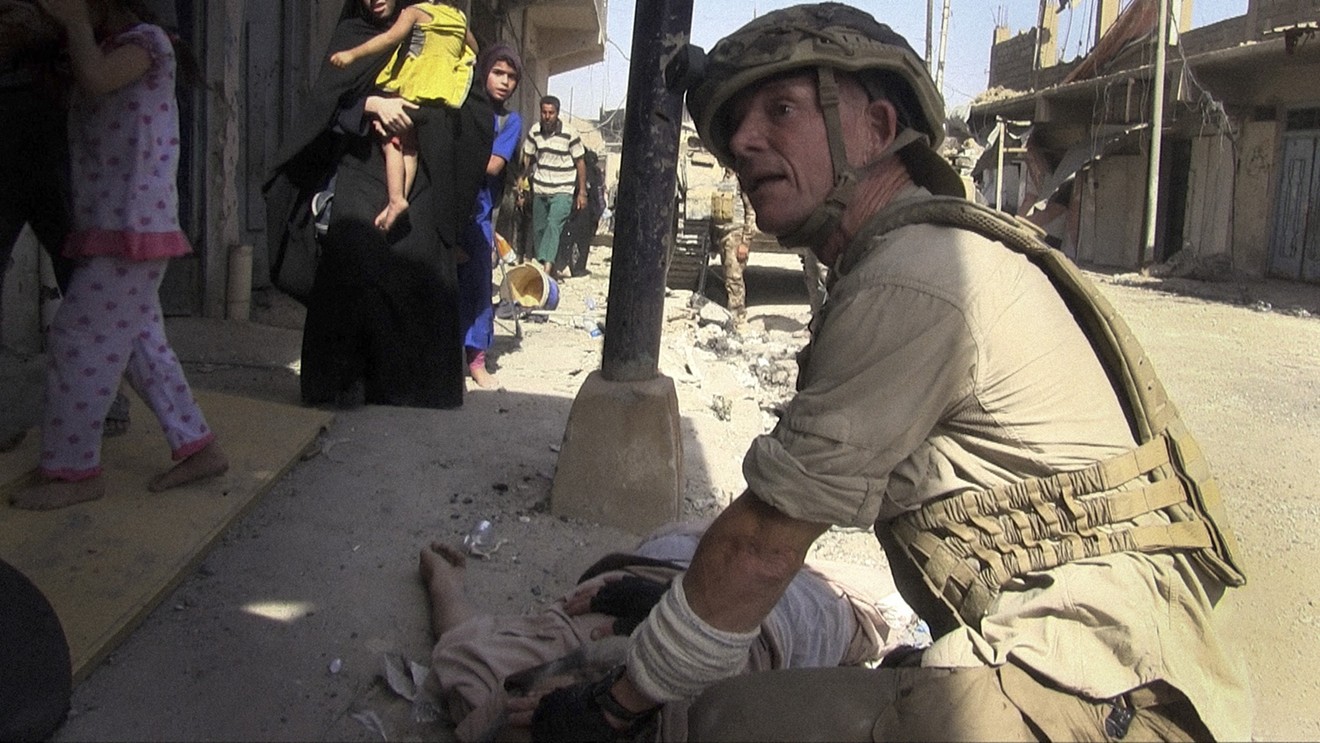When he sent an email to the Free Burma Rangers in early 2004, filmmaker Chris Sinclair didn’t expect that in a few short months he’d be hiking across Thailand taking photos of displaced individuals. And he certainly didn’t expect that years later, he’d create a documentary telling the story of the FBR and their founder, David Eubank.
“I think what it does is, it lifts the veil of the headlines of what we’re familiar with,” Sinclair says of his film, Free Burma Rangers. “Whatever little or distorted view of Iraq or Burma we have, I think those places become real and human, and I think we can be a lot more nuanced in our conversations about the topics of war and displacement and migrants when you see and understand their stories.”
Sinclair is a Dallas-based documentarian whose Free Burma Rangers will be screened as a nationwide Fathom Event on Monday-Tuesday, Feb. 24-25. The film tells the story of Eubank, who spent 10 years as a U.S. Special Forces officer and who's led hundreds of rescue and relief missions in Myanmar (formerly Burma) and Mosul, Iraq.
Using both his military training and his Christian faith, Eubank founded the Free Burma Rangers in 1997 and has raised his family in Burma. Eubank’s wife, Karen, has developed educational and rehabilitation programs for children of war-torn countries, and their children, Sahale, Suzanne and Peter, have participated in relief missions.
The Free Burma Rangers have trained over 4,500 members, undertaken over 800 humanitarian missions, treated over 500,000 patients and served as many as 1.5 million civilians. The documentary aims to shed light on the groundbreaking work done by the group and its founder, exploring how Eubank’s military training and faith led him to save countless lives.“He’s putting his money where his mouth is, he’s putting his life on the line." — Chris Sinclair
tweet this
“He is just a very, very uniquely qualified individual with a very unique history, on both the faith side, being the son of a missionary, and on the military side, being able to operate competently in combat zones,” Sinclair says. “He’s former special forces; I don’t think anyone else would be the right fit for this kind of work.”
Eubank made national headlines in 2017 when a video of him saving a young girl from ISIS gunfire in Mosul went viral. Sinclair says Eubank’s willingness to put his life on the line for others was inspiring throughout the course of their journey together.
“He’s putting his money where his mouth is, he’s putting his life on the line,” Sinclair says. “He’s very bold and he’s also very humble, and I think other local leaders of resistance groups who control these territories ... all love him because they can see eye to eye with him.”
Sinclair began filming in 2012 in Burma and joined the Free Burma Rangers on multiple missions that spanned several months, with an average hike length of 300 miles per trip. Sinclair also tagged along when the Eubank family ventured into Iraq in 2016.
It was often a dangerous and emotionally grueling task: Sinclair was shot at three times and witnessed many wartime atrocities. What kept Sinclair inspired was his belief in Eubank’s teachings and getting the chance to raise awareness of his message of faith and forgiveness.
“I think the common denominator is that whatever faith you ascribe to, love can do powerful things,” he says of Eubank’s character. “One of my favorite lines is in the baptism scene, he says, ‘Forgiveness is a counter warfare that has eternal energy to it.’ That’s one of those phrases that I just keep going back to and thinking about — when we can forgive even our enemies.”
Sinclair says that because of his long trips and extensive interviews, some powerful footage had to be cut for the sake of time. One instance, in which a young boy who was found brutally burned made a miraculous recovery in a hospital in Thailand, was among the most emotionally affecting moments for Sinclair.
“It was a great kind of beginning, middle and end that we had on tape that easily could’ve been a great hook to set people up and pay it off with this magnificent recovery,” he says. “It was one of those things where you clearly see the impact, and it’s definitely part of the story.”
Sinclair graduated with a degree in visual communication from Ohio University and lived for many years among the Shan people in China. He says his experience being the only English-speaking person in his community helped him relate to Eubank’s passion for helping marginalized people.
“I definitely related on the level of a strong sense of injustice for people that are close to us,” he says. “I felt like the Shan were my friends, and if I met new Shan people experiencing injustice in Thailand or in Burma, I aligned with Dave in that I wanted to help them and advocate for their experiences and greater sense of justice.”
Eubank had been approached about making a documentary about his work several times by networks, including HBO and National Geographic, but he resisted because he didn’t want to outshine the experiences of those who were suffering. When Eubank agreed to Sinclair’s request to make the film, it was important to Sinclair to use Eubank’s story to shine a light on the people of Burma and Iraq.
“He thought that the more compelling story was the people who were enduring suffering,” Sinclair says of his subject and friend. “He always wanted to highlight the locals that were living displaced or the ethnic teams that were doing the work. He always said to focus on them, that they’re the real story.”
Free Burma Rangers was produced by LifeWay Films and Deidox Films. Tickets are available through FathomEvents.com.













